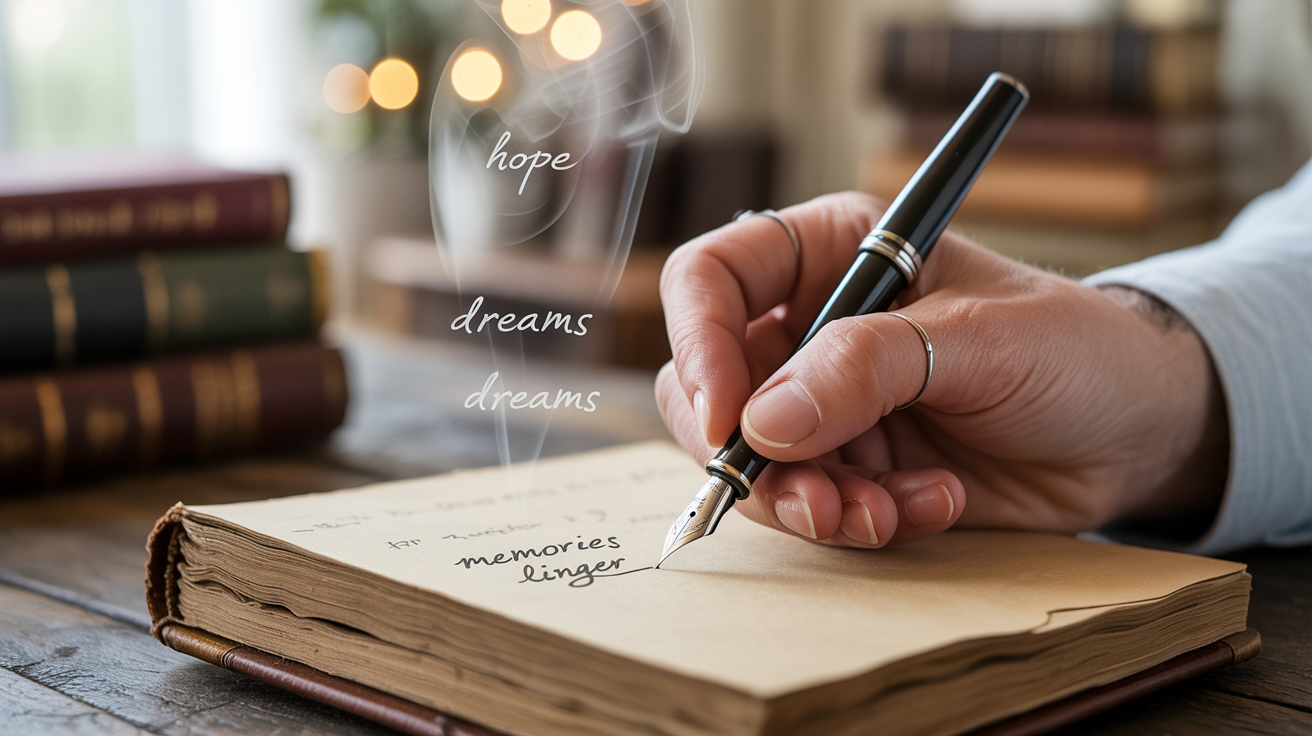
How to Explore Your Core Beliefs Through Journaling
You make thousands of decisions every day, from what to eat for breakfast to how to respond to conflict at work. But have you ever wondered what invisible force guides these choices? Hidden beneath your conscious thoughts lies a powerful network of core beliefs—fundamental assumptions about yourself, others, and the world that shape every aspect of your life.
Most people live their entire lives without examining these deep-seated beliefs, even though they’re the architects of their reality. Research by cognitive psychologist Dr. Aaron Beck shows that our core beliefs, formed primarily in childhood and adolescence, influence our thoughts, emotions, and behaviors more than any external circumstance.
The remarkable thing? You can uncover, examine, and transform these beliefs through one of the most accessible tools available: journaling. This isn’t about casual diary-keeping or daily gratitude lists—it’s about using structured writing as a form of psychological archaeology, excavating the beliefs that run your life from behind the scenes.
Understanding Core Beliefs and Their Hidden Power
Core beliefs are your fundamental assumptions about reality—the mental software that runs automatically in the background of your mind. Unlike surface-level thoughts or opinions, these beliefs feel absolutely true and rarely get questioned. They’re the lens through which you interpret every experience.
Dr. Judith Beck, director of the Beck Institute for Cognitive Behavior Therapy, describes core beliefs as “global, rigid, and overgeneralized” thoughts that people hold about themselves, others, and the world. They typically fall into categories like “I am worthy/unworthy,” “People are trustworthy/dangerous,” or “The world is safe/threatening.”
These beliefs form during your earliest years when your brain was developing and you lacked the critical thinking skills to evaluate what adults told you or what you concluded from your experiences. A child who repeatedly hears “You’re too sensitive” might develop the core belief “My emotions are wrong.” Someone who experienced inconsistent caregiving might believe “I can’t rely on anyone.”
The power of core beliefs lies in their self-fulfilling nature. If you believe “I’m not good enough,” you’ll unconsciously look for evidence to confirm this belief while dismissing contradictory information. You might downplay your successes, focus on your mistakes, or avoid opportunities where you might fail.
Understanding your core beliefs isn’t just intellectual exercise—it’s the key to understanding why you keep repeating certain patterns and how to create lasting change in your life.
The Categories of Core Beliefs That Shape Your Reality
Core beliefs typically cluster around several fundamental themes that reflect basic human needs for safety, belonging, and self-worth.
Self-Worth Beliefs: These beliefs determine how you see your inherent value as a person. Positive beliefs might include “I am worthy of love” or “I have value regardless of my achievements.” Limiting beliefs often sound like “I’m not good enough,” “I’m fundamentally flawed,” or “I don’t matter.”
Safety and Control Beliefs: These beliefs shape how safe you feel in the world and how much control you believe you have over your life. Empowering beliefs include “I can handle whatever comes my way” or “I have influence over my circumstances.” Limiting versions might be “The world is dangerous” or “I’m powerless to change my situation.”
Connection and Trust Beliefs: These determine how you approach relationships and whether you believe others are generally safe and trustworthy. Healthy beliefs include “People are generally good” or “I can form meaningful connections.” Problematic beliefs might be “People always leave” or “I can’t trust anyone.”
Competence and Capability Beliefs: These beliefs influence how confident you feel about your abilities to learn, grow, and succeed. Positive beliefs include “I can learn and improve” or “I’m capable of achieving my goals.” Limiting beliefs often sound like “I’m not smart enough” or “I always fail.”
Meaning and Purpose Beliefs: These beliefs shape whether you see life as meaningful and whether you believe you have something valuable to contribute. Empowering beliefs include “My life has purpose” or “I can make a difference.” Limiting beliefs might be “Nothing I do matters” or “Life is meaningless.”
Most people have a mix of empowering and limiting beliefs across these categories, creating a complex internal landscape that influences different areas of life in different ways.
Why Journaling Is Uniquely Powerful for Belief Exploration
While therapy, meditation, and conversation can help uncover core beliefs, journaling offers unique advantages that make it particularly effective for this deep work.
Bypasses Mental Defenses: When you write freely without censoring yourself, you often access thoughts and feelings that your conscious mind normally filters out. The act of putting pen to paper can reveal beliefs you didn’t even know you held.
Creates Emotional Safety: Unlike speaking aloud, writing provides a private space where you can explore sensitive topics without fear of judgment. This safety allows for more honest self-examination.
Provides Tangible Evidence: Written words create a record you can review and analyze. Patterns become visible when you can see your thoughts on paper across multiple entries.
Engages Different Brain Regions: Research shows that handwriting activates different neural pathways than typing or speaking, often leading to deeper insights and emotional processing.
Allows Processing Time: Unlike conversation, journaling lets you pause, reflect, and go deeper without pressure to respond immediately. You can sit with difficult realizations and explore them gradually.
Facilitates Pattern Recognition: Over time, journaling reveals recurring themes, triggers, and responses that point to underlying beliefs. What seems like isolated incidents often reveal systematic patterns.
Promotes Integration: The act of writing helps integrate conscious and unconscious material, making implicit beliefs explicit and therefore changeable.
Common Obstacles to Uncovering Your Beliefs
Several challenges can prevent people from successfully exploring their core beliefs through journaling, but understanding these obstacles helps you navigate them effectively.
Fear of What You’ll Discover: Many people avoid deep self-exploration because they’re afraid of finding painful truths about themselves or their past. This fear often keeps limiting beliefs safely hidden but unchanged.
Perfectionism and Judgment: Some people get stuck trying to write perfectly or judge their thoughts as they emerge. This self-censorship prevents the free-flowing exploration necessary for uncovering hidden beliefs.
Lack of Structure: Without clear prompts or frameworks, many people don’t know how to dig beneath surface thoughts to reach core beliefs. They might write about daily events without accessing deeper material.
Overwhelm and Avoidance: When painful memories or beliefs surface, some people shut down or avoid journaling altogether. Learning to stay present with difficult emotions is crucial for this work.
Intellectualization: Some people stay in their heads, analyzing and theorizing about their beliefs rather than feeling into them. Core beliefs are often more emotional than logical.
Impatience for Quick Results: Uncovering core beliefs takes time and patience. Some people give up when they don’t have immediate insights or breakthroughs.
Resistance to Change: Even when limiting beliefs are identified, part of you might resist changing them because they feel familiar and safe, even if they’re not serving you.
Recognizing these obstacles with compassion allows you to work through them rather than let them stop your exploration.
Essential Journaling Tools and Techniques
Several specific journaling methods are particularly effective for uncovering and exploring core beliefs. These tools provide structure while allowing for organic discovery.
Stream of Consciousness Writing: Set a timer for 10-20 minutes and write continuously without stopping, editing, or censoring. Let your thoughts flow onto paper without judgment. This technique often reveals subconscious material.
Trigger Analysis: When you have a strong emotional reaction to something, journal about it immediately. Ask: What exactly triggered me? What thoughts went through my mind? What did this situation remind me of? What does this reveal about what I believe?
Childhood Memory Exploration: Write about significant childhood experiences, both positive and negative. Look for themes and messages you internalized. What conclusions did your young self draw about yourself, others, or the world?
Values Archaeology: Explore where your values came from. Write about which values truly feel like yours versus which ones you adopted from family, culture, or society. Notice any conflicts between inherited and authentic values.
Inner Dialogue Transcription: Pay attention to your internal self-talk and write it down exactly as it occurs. Often, this inner voice reveals core beliefs about your worth, capabilities, or safety.
Future Self Visualization: Write from the perspective of your ideal future self. What beliefs would this version of you hold? What would need to change in your current belief system to become this person?
Letter Writing: Write letters to your younger self, your parents, or important figures from your past. This can reveal beliefs you formed about yourself and relationships.
A Step-by-Step Guide to Belief Exploration
Systematic exploration of your core beliefs requires patience and structure. This guide provides a framework for gradually uncovering and examining your deepest assumptions.
Step 1: Create Your Sacred Writing Space
Establish a consistent time and place for this deep work. Choose a quiet space where you won’t be interrupted, and create rituals that signal the importance of this practice—lighting a candle, making tea, or sitting in a special chair.
Commit to writing by hand rather than typing when possible. Research shows that handwriting engages different parts of the brain and often leads to deeper insights than digital writing.
Step 2: Begin with Gentle Exploration
Start each session with 5-10 minutes of stream-of-consciousness writing to clear your mind and access your authentic voice. Don’t worry about grammar, spelling, or making sense—just let thoughts flow onto paper.
Use prompts like: “Right now I’m feeling…” “Something that’s been on my mind lately is…” or “If I’m completely honest with myself…” These gentle openings help bypass mental defenses.
Step 3: Identify Emotional Patterns
For one week, journal about your emotional reactions throughout each day. When do you feel confident versus insecure? Trusting versus suspicious? Hopeful versus hopeless?
Look for patterns across different situations. If you consistently feel anxious in social situations, what belief might be driving that anxiety? If you often feel unworthy of good things, what core belief about your value might be operating?
Step 4: Explore Your Origins
Once you identify potential beliefs, explore where they came from. Write about early memories related to each theme. What messages did you receive about your worth, abilities, or safety? What conclusions did you draw from difficult experiences?
Ask questions like: “What did I learn about myself when…?” “What did this experience teach me about others?” “What rule did I create to protect myself?” Be patient—these connections often emerge gradually.
Step 5: Challenge and Reframe
After identifying limiting beliefs, begin questioning their validity. Write evidence for and against each belief. Ask: “Is this absolutely true?” “What would I tell a friend who believed this about themselves?” “How has this belief served me, and how has it limited me?”
Begin exploring alternative beliefs that feel both more accurate and more empowering. What would you prefer to believe? What evidence supports these new beliefs?
Powerful Prompts for Deep Belief Exploration
These specific prompts are designed to uncover core beliefs across different life areas. Choose prompts that resonate with you and spend 15-20 minutes exploring each one deeply.
Self-Worth Exploration:
- “I deserve good things when…”
- “I feel most valuable when I…”
- “The voice in my head often tells me I’m…”
- “If people really knew me, they would think…”
Safety and Control:
- “The world feels dangerous when…”
- “I feel most secure when I have control over…”
- “My biggest fear about the future is…”
- “I learned that life is unpredictable when…”
Relationships and Trust:
- “In relationships, I often worry that…”
- “I have trouble trusting people who…”
- “Love feels safe when…”
- “I learned about relationships by watching…”
Capability and Success:
- “I avoid trying new things because…”
- “Success means…”
- “I feel most capable when…”
- “Failure proves that I’m…”
Meaning and Purpose:
- “My life matters because…”
- “I feel most alive when…”
- “I was put on this earth to…”
- “Nothing I do matters when…”
Spend time with each prompt, allowing thoughts and feelings to emerge without forcing insights.
Your Journey to Belief Transformation
Exploring your core beliefs through journaling isn’t just an intellectual exercise—it’s a path to profound personal transformation. When you understand the beliefs that have been running your life from behind the scenes, you gain the power to consciously choose which ones to keep and which ones to change.
Remember that this is ongoing work, not a one-time project. Your beliefs formed over years or decades, and transforming them takes patience and self-compassion. Some beliefs may change quickly once you shine light on them, while others may require months or years of conscious work.
Be gentle with yourself as you uncover limiting beliefs. These beliefs often developed as protective mechanisms during challenging times in your life. Honor the part of you that created these beliefs to keep you safe, even as you outgrow them.
Start your exploration today with just 15 minutes of writing. Choose one prompt that speaks to you, set a timer, and let your authentic voice emerge on paper. Your most empowering life is waiting on the other side of examining and transforming the beliefs that no longer serve you.
The pen in your hand is a key to unlocking your deepest truths. Your authentic self is ready to be discovered.








